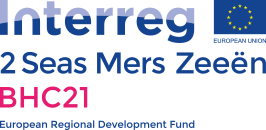Building Human Capital in the 21st Century
Value of EU Grant - €2,256,124.80
Name of funding programme - Interreg Two Seas Programme (2014-2020)
Start and end dates - April 2019 to July 2022 (extended to December 2022)
Building Human Capital in the 21st Century (BHC21) seeks to address skill shortages in the engineering and manufacturing sector by providing rapid, cost effective training for low skilled and/or unemployed people.
BHC21 will apply state of the art training methodologies that use Innovative Learning Technologies (ILTs), such as virtual reality, augmented reality, video instruction, guided-by-light, and training apps.
The project will also develop new methods of technical and vocational instruction, providing industry-based coach/mentors with training skills and by addressing barriers to learning.

UK:
- Kent County Council
- Mid Kent College
- University of Greenwich
- The Tavistock Institute of Human Relations
Belgium:
- West Flanders Development Agency
- Flemish Employment Mediation and Vocational Training service
- Skilliant
- Sirris
- Catholic University Leuven
France
- Sud Concept Hauts de France
- CETIM – Technical Centre for Mechanical Industry
- Santerre Haute Somme Centre for Companies, Employment & Training
Observer partners
- Department for Work and Pensions (United Kingdom)
- Sterepunt Inclusief Ondernemen (Belgium)
- Vormingsfonds voor Uitzendkrachten (Belgium)
- Pole Emploi Hauts de France (France)
BHC21 aims to contribute to the development of efficient and effective technical training for low skilled people, for employment in manufacturing and engineering.
The project will develop a 21st century training model which:
- makes use of innovative learning technologies, with accompanying instructional design (tailored for small and medium enterprise businesses)
- integrates new recruitment and training approaches to increase the success of training.
BHC21 will run pilots to integrate Innovative Learning Technologies (ILTs) and modern teaching (pedagogical) approaches in vocational training for low skilled people for the manufacturing industry.
Aided by innovative recruitment methods, these pilots will help to identify and reduce learning barriers and enhance understanding of the potential of ILTs and pedagogical approaches.
A new training model, including the training of work floor coaches, will be jointly developed, tested, validated and evaluated. The final output is a feasibility report based on the pilots, demonstrating the economic and sustainable viability of the BHC21 training model.
The anticipated outcome will be improved quality of training. From a learner's perspective this will include increased motivation, less stress and higher perceived usefulness. This will also help small and medium enterprise businesses to find and retain trained staff and will enable lower skilled persons to establish sustainable careers.
Public employment services, lower skilled people and companies suffering skills shortages will all benefit.